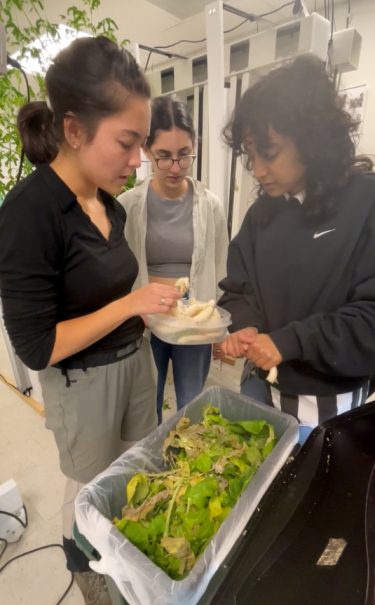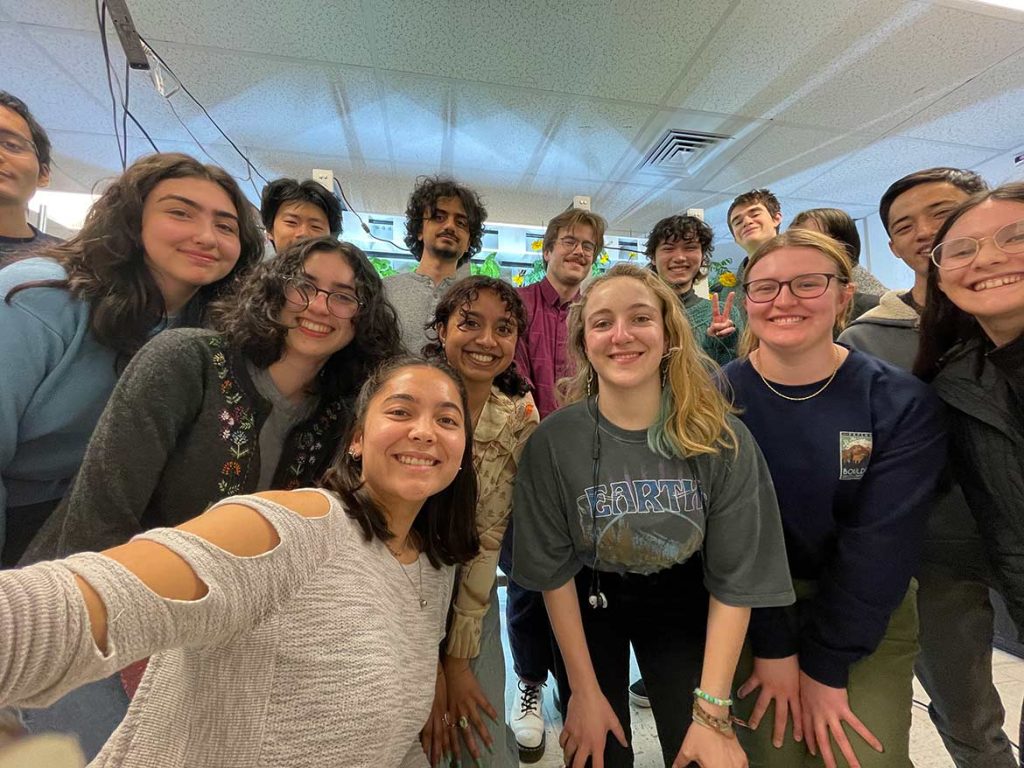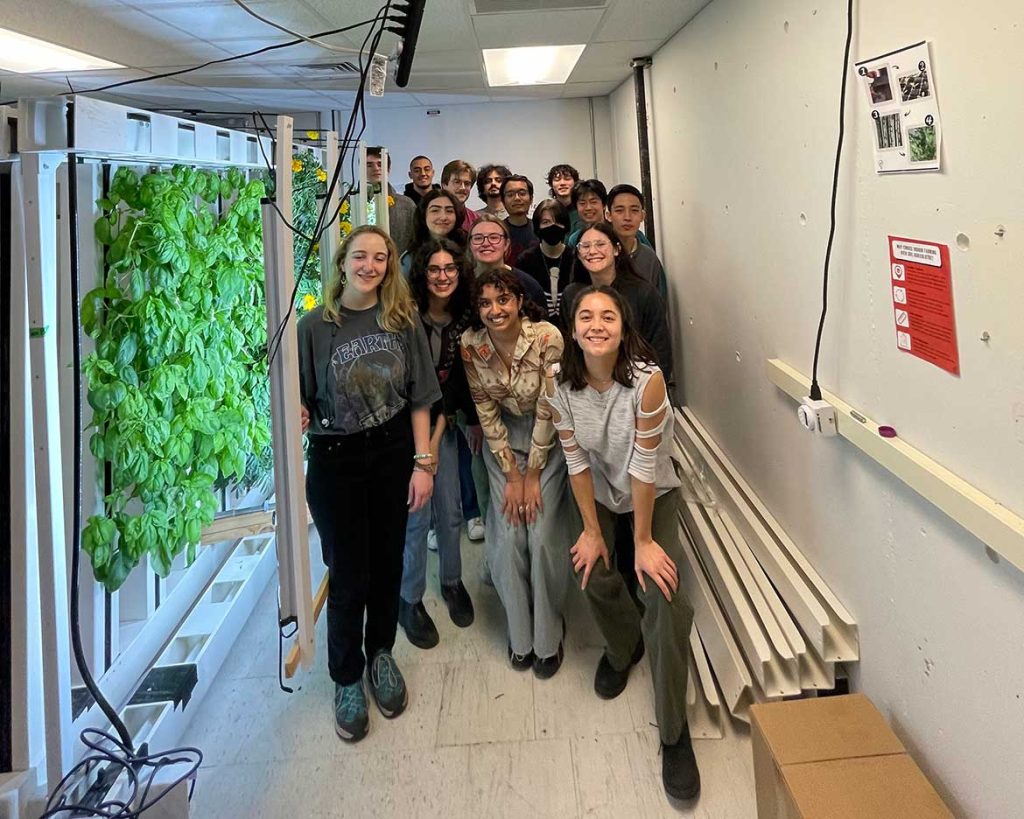Student-led hydroponics farm cultivates food and a growing community
By Lori Tiede
An indoor hydroponic farm at University of Washington is bringing awareness to sustainable alternatives to soil-based agriculture
Three University of Washington students work side by side to harvest a new crop of Daikon radishes from the small vegetable and herb farm they help operate out of a classroom in Condon Hall.

Radishes are one of the experimental crops this year for Project Indoor Farm (Project IF), a student-run hydroponic farm operation that is backed by a community of dedicated students coming together from many different disciplines across campus.
The indoor farm recently relaunched itself as a UW student organization sponsored by the Food Systems, Nutrition, and Health Program (FSNH) in the School of Public Health which aligns with the group’s mission to spread awareness about sustainable alternatives to traditional, soil-based agriculture and resilient food systems.
The club’s faculty advisor is Yona Sipos, an associate teaching professor in FSNH. Sipos also co-chairs the UW Farm Advisory Committee with Eli Wheat, an assistant teaching professor in FSNH and Program on the Environment, who is also another informal advisor for the indoor farm.
Amelie Gahagan studies finance and environmental studies, and also works as an indoor farm manager. Gahagan has been involved with Project IF for three years since she was a freshman and has enjoyed watching the farm grow in that time.
“I love it when students get hands-on experience with hydroponics and plants,” said Gahagan. “This was one of my first experiences with nature in general. I think it can be very powerful for students to have exposure to industries they haven’t experienced before.”
Mira Menon, a Public Health-Global Health major and chemistry minor, joined the farm last year and works as an operations lead.
“The sustainability aspect of the club is what drew me to the project. Urban and local farming is such an exciting part of public health and it’s really upcoming right now,” said Menon.
“As cities become more developed and populated, the land to grow crops decreases. This type of farming is so space efficient. It has the potential to make produce more accessible to communities that don’t have that access.”
Farming in a classroom
The indoor farm sits in a 400-square foot classroom without windows, a controlled environment so the students can control every aspect of the growing conditions.
Crops are grown vertically on two double-sided racks with 5-foot ZipGrow Towers and LED grow lights the students call educational towers. The racks feature a drip and wick system that recycles water, rather than wastes it.
Each day someone performs maintenance by checking the water to make sure Ph and EC levels are in balance.
Take a Tour of Project IF
Farm Manager Amelie Gahagan gives a tour of the indoor farm.
Crops yield food and community
The Daikon radishes the students just harvested will be used in a pickling workshop at the group’s weekly meeting.
A big perk of membership is enjoying the food the indoor farm grows.
“There’s a big community aspect of the farm,” said Anna Phillips, the farm’s outreach coordinator. “We all come together to the farm every single day, you get to meet people, then we also get to eat the food we make together, and connect with the food you’re eating, and have fun.”
Phillips is a political science major and global and regional studies major and enjoys having the outlet of working with plants.

Students gather regularly for community meals such as a pesto pasta party to use up the basil they grow, and make salads featuring the fresh greens.
Since the start of the year, the farm has grown rainbow Swiss chard, chocolate bell peppers, red radishes, marigolds, kale, lettuce, basil, and mint.
“At this point we can cycle through any of these crops,” said Menon.
Phillips adds that when they are growing at full capacity, they can grow up to 256 heads of lettuce at a time which can go from seed to harvest in just 4-6 weeks.
They are now experimenting with their first crop of cherry tomatoes.
Innovating and learning as they go
Leveraging the different skill sets of its members and adapting to change is another key component of the indoor farm’s success.
Members bring their skills from computer science, microbiology, food systems, nutrition, and health, political science, public health-global health, and many other programs.

For many months during the early days of COVID-19, the farm was not operating.
“Getting back up and operational was something we all worked to do together,” said Gahagan.
Project IF is definitely resilient.
The farm originated in 2016 by founding member Kurt Kung, a postdoctoral bioengineering researcher who wanted to explore the feasibility of indoor growing to share with other universities. Kung secured initial funding from the UW’s Campus Sustainability Fund, then won a Husky Green Award, and recruited others to join.
Now as an RSO, the group is focusing on activities to educate and offer resources to the campus community.
Collaborations and activities
The indoor farm has connected with the UW Food Pantry in the past about serving as a resource for students.
Philips said, ”I know at the UW Food Pantry they have a lot of trouble getting fresh produce in the winter time. There is a lot of room for hydroponics and other new solutions to continue providing and making produce accessible to people, even here in the U District.”
The indoor farm has opened up their space to the UW Food Pantry patrons for those times when fresh vegetables are not available and Project IF has excess produce.
Members of the indoor farm are always busy with new crop research, data gathering, inventing ways to automate and streamline their operation, and opportunities to expand beyond their current research space.
They are currently collaborating with one of the spring Food Systems Capstone (NUTR 493) projects to investigate a community hydroponic system for a new iUrban Teen garden at Rainier Community Center.
Some upcoming opportunities through spring quarter include:
- Urban Farming Panel: Urban farming experts including Sipos and fellow RSO’s will join a panel to talk about the future of urban farming on May 7, from 4:30-5:30pm, Condon Hall 115
- General Meetings on Tuesdays: Come meet other club members and take a tour of the farm! Every Tuesday, 4:30-5:30pm, Condon Hall 115
- Marigold Harvest, Cherry Tomato Harvest, and Lettuce Harvest: Dates are still TBD, but expected up by the end of the quarter!
Become a member of Project IF or learn more
Project IF is open to all UW students and community members that have a passion for the project or are interested in learning more.
- Website: https://projectindoorfarm.squarespace.com/
- Discord: https://discord.gg/bU3bgTKYMH
- Instagram: @projectindoorfarm
- Facebook: https://www.facebook.com/projectifuw/
- Linkedin: https://www.linkedin.com/company/project-if-uw/
April 18, 2024